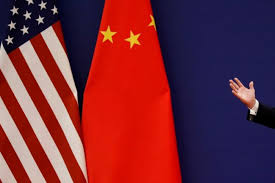China, U.S. agree tariff rollback if phase one trade deal is completed

China and the United States have agreed to roll back tariffs on each others’ goods in a “phase one” trade deal if it is completed, officials from both sides said on Thursday, sparking division among some advisers to President Donald Trump.
The Chinese commerce ministry, without laying out a timetable, said the two countries had agreed to cancel the tariffs in phases.
A U.S. official, speaking on condition of anonymity, confirmed the rollback would be part of the first phase of a trade agreement that is still being put to paper for Trump and President Xi Jinping to sign.
White House spokeswoman Stephanie Grisham told Fox News Channel the United States is “very, very optimistic” about completing a deal that would defuse a 16-month trade war between the world’s two largest economies.
“I cannot get ahead of the talks with China, but we are very, very optimistic that we will reach a deal soon,” she said.
Experts warn the pact could still fall apart. U.S. officials said a lot of work remained to be done when Trump announced the outlines of an interim deal last month.
Trump has used tariffs on billions of dollars of Chinese goods as his primary weapon in the protracted trade war. The prospect of lifting them, even in phases, has drawn fierce opposition from advisers in and outside of the White House who remain wary of giving up a key aspect of U.S. leverage.
U.S. stocks pared gains after Reuters reported that the plan faced internal opposition.
“There is no specific agreement for a phased rollback of the tariffs,” said Michael Pillsbury, an outside adviser to Trump.
“The American side has been ambiguous when and which tariffs will be lifted. The Chinese have some wishful thinking and are trying to soothe their domestic hardliners that the tariffs will someday come off.”
If an interim deal is finished and signed, it is widely expected to include a U.S. pledge to scrap tariffs scheduled for Dec. 15 on about $ 156 billion worth of Chinese imports, including cell phones, laptop computers and toys.
Tariff cancellation was an important condition for any agreement, Chinese Commerce Ministry spokesman Gao Feng said, adding that both must simultaneously cancel some tariffs on each other’s goods to reach the phase one pact.
“Both sides have agreed to cancel additional tariffs in different phases, as both sides make progress in their negotiations,” Gao told a regular briefing.
A spokesman for the U.S. Treasury department declined to comment and the U.S. Trade Representative’s office did not immediately respond to a request for comment.
Republican lawmakers are urging the Trump administration to tie any tariff rollbacks to Beijing’s compliance with specific elements of the agreement.
“The tariffs should be phased out piece by piece as China complies,” one congressional source said.
TRUMP-XI MEETING
In what could be another gesture to boost optimism, China’s state news agency Xinhua reported late on Thursday that the Chinese customs and Ministry of Agriculture are considering removing restrictions on U.S. poultry imports. [B9N26I016]
China has banned all U.S. poultry and eggs since January 2015 due to an avian influenza outbreak.
The optimism over a phase one trade deal boosted stocks globally; bond yields shuffled higher.
A source previously told Reuters that Chinese negotiators wanted the United States to drop 15% tariffs on about $ 125 billion worth of Chinese goods that took effect on Sept. 1.
They also sought relief from earlier 25% tariffs on about $ 250 billion of imports, ranging from machinery and semiconductors to furniture.
A person familiar with China’s negotiating position said it was pressing Washington to “remove all tariffs as soon as possible”.
A deal may be signed before the end of the year by Trump and Xi at a yet-to-be determined location.
Dozens of venues have been suggested for a meeting, which had originally been set to take place on the sidelines of a now-cancelled mid-November summit of Asia-Pacific leaders in Chile, a senior Trump administration official told Reuters on Wednesday.
One possible location was London, where the leaders could meet after a NATO summit that Trump is due to attend from Dec. 3-4, the official said.
Gao declined to say when and where such a meeting could be.
Since Trump took office in 2017, his administration has been pressing China to curb massive subsidies to state-owned firms and end the forced transfer of American technology to Chinese firms as a price of doing business in China.
The president’s tough stance on China has earned him praise from his political base, and he may be reluctant to appear conciliatory on the issue going into his 2020 re-election campaign. But Trump has also sought to portray stock market gains as a reflection of his stewardship of the economy, and the market has reacted positively to any hints of an end to the two countries’ trade dispute.
